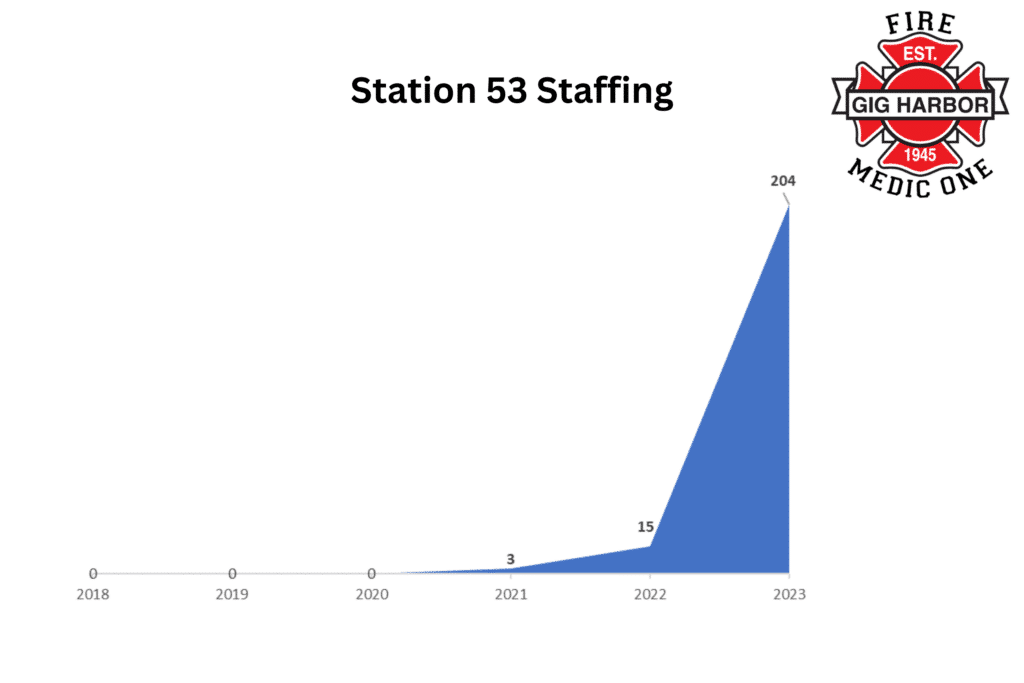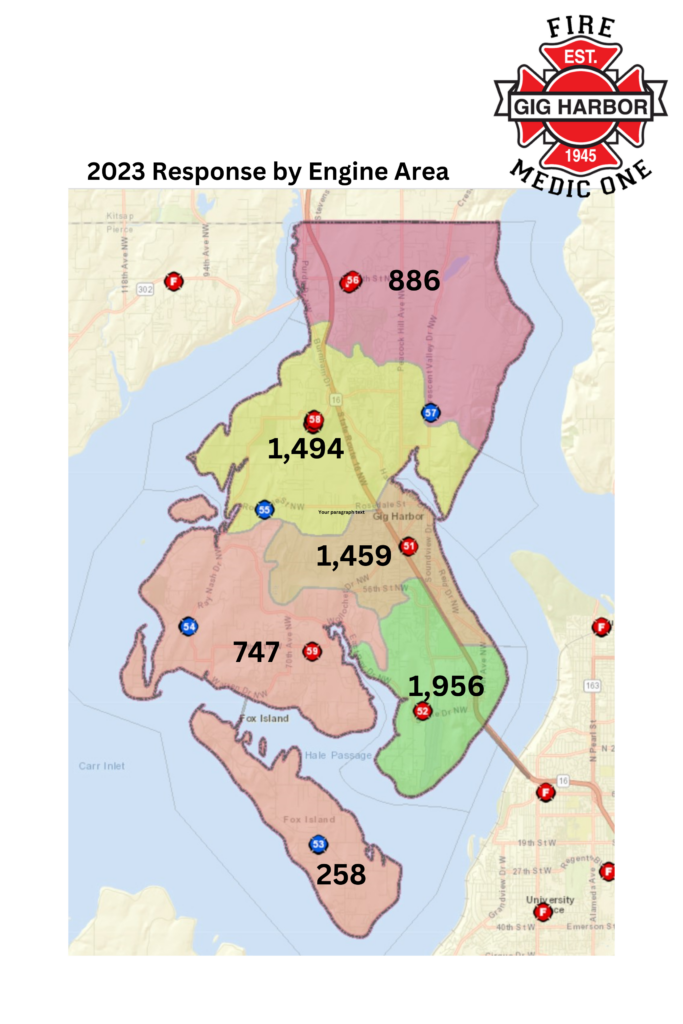Community Police & Fire
Fire department taking heat for rising home insurance costs
Some Fox Island residents are blaming a downgraded fire-protection rating for steep hikes in home insurance costs. Though a shift from volunteer to career firefighters triggered the reduction, the move camouflages larger issues, Gig Harbor Fire & Rescue One Chief Dennis Doan said.
Many insurance companies rely on 5-year appraisals by Washington Surveying and Rating Bureau (WSRB). In this case, Doan doesn’t believe that rating reflects the true service level.
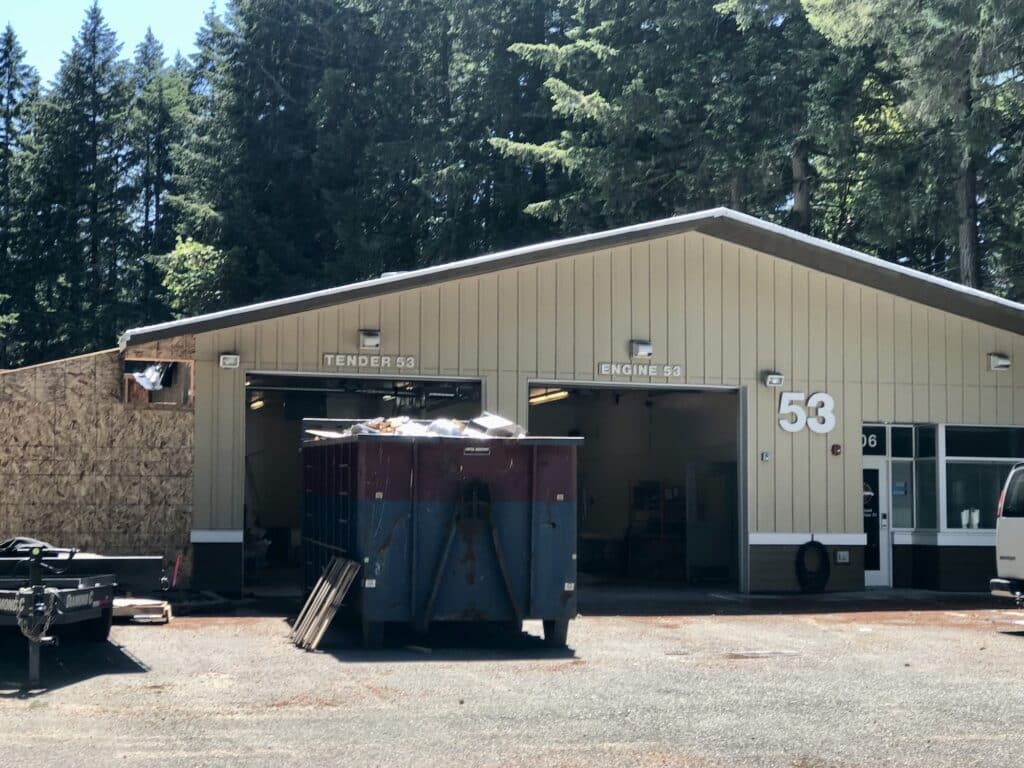
Crews are adding a decontamination area and fifth bedroom to the Fox Island fire station. After that’s completed late this year, Station 51 on Kimball Drive will be torn down and replaced and some of its personnel will move to Fox Island. Photo by Ed Friedrich
The department increased staffing of full-time emergency responders at Fox Island’s Station 53 from 15 days in 2022 to 204 in 2023, yet the protection class dropped from 5 to 9, or nearly nonexistent. The rating bureau downgraded only the island’s south end because homes on the north are within five miles of Artondale Station 59.
“We have increased staffing,” Doan said. The fire district “went from two-person companies to three-person a year ago. We staffed the Fox Island station over 200 times last year, but our rating went down. That makes absolutely no sense.”
Volunteer firefighters and insurance rates
When WSRB previously rated the Fox Island station in 2018, it had at least four volunteers, said spokesman Robert Ferrell. Gig Harbor Fire dissolved the volunteer program in 2023, before the most recent rating.
“The reason for the rating change was due to the fire station out there on the island, Fire Station 53, being no longer a full-time active station and the next-closest station was several miles away from quite a few of those homes,” Ferrell said.
WSRB considers volunteers as being available every day of the year while the full-time crews weren’t.
“Volunteers are certainly acceptable for fire station staffing,” Herrell said. “When we were last out there they had enough volunteers and they were responding. Over time the volunteers dwindled away. It got to the point where they didn’t have any active response out of that station for a good portion of the year. They were able to staff it (with full-timers) 204 days out of the year (in 2023), but the rest of the year there was no active response out of it. The only recognizable stations are ones that can provide response year round.”
When the volunteer program ended in 2023, Fox Island had just three or four non-responding EMS volunteers, Doan said. They helped with CPR classes and community events, but didn’t respond to calls. The station hadn’t had responding volunteers since 2020, when there were four.
‘No regulation whatsoever’
Home insurance costs are soaring everywhere, not just at companies that use the WSRB ratings.
“I think we’re too hyper-focused on WSRB and this rating,” Doan said. “Yes, (the downgrade) did happen. I think (insurance) agents are throwing Gig Harbor Fire under the bus and blaming us, and it isn’t fair. Even insurance companies that don’t use WSRB are going up at the same rate. It’s happening industry wide. This rating and the hyper-focus on WSRB and our staffing is really moot. The real story is insurance rates are skyrocketing.”
That’s not to say Doan is pleased with WSRB, an independent, nonprofit organization based in Tukwila. Staffing is one of many criteria, which include a home’s distance from a fire station and fire hydrant, and water flow.
“My biggest frustration is with WSRB,” Doan said. “First, they call themselves ‘Washington.’ It’s not a government agency, and everybody thinks they are. They work for the insurance companies. They have no regulation whatsoever. There are no governing bodies over them. We have no recourse as a department, as a community, as an industry.
“Their regulations are antiquated. They’re 1970s stuff. We have the National Fire Protection Association. We asked them why don’t you adopt these national standards that are up to date. They say we’d be out of a job if we did that. They are literally beholden to nobody, and that’s what frustrates me the most.”
Doan spoke to the state insurance commissioner’s office last week. Representatives from the office told him they can’t do anything unless WSRB is breaking the law, which it isn’t.
Possible legislative solution?
Doan, who serves on the Washington Fire Chiefs board, has asked for a meeting to discuss changing state law.
County Councilwoman Robyn Denson says she’ll help.
“It’s not fair to the residents and to the fire departments that are working so hard,” said Denson, whose District 7 includes Fox Island and the Gig Harbor area. “It definitely seems like state law needs to change in regard to how ratings are calculated. It will benefit not only Gig Harbor but everyone in the state of Washington to apply fair and current fire standards.
“But we need to help people understand that it’s not the fire department’s fault. They’re doing everything they can to provide the service, but the rating is not reflecting the level of service.”
The Gig Harbor fire department gradually transitioned during its lifetime from solely volunteer to fully paid staff. The district completed the shift last year.
In the past, volunteers served all nine stations. Now, five are staffed by full-timers and four are not staffed. The district made the move to raise minimum standards, Doan said. Firefighting requires much training and volunteers sometimes struggle to remain up to date.
Fox Island wasn’t staffed by full-timers at all in 2018 and 2019 and rarely after that until 2023. Then Doan began assigning extra crews there, and at least two firefighters or paramedics were on site 204 days.
Rebuilding fire stations
Fox Island is temporarily without any staff now as contractors began remodeling the firehouse and Crescent Valley Station 57 last month as the first phase of an $80 million capital improvement program. The district is adding a decontamination room — cancer is the No. 1 killer of firefighters — and fifth bedrooms to accommodate three-person fire engine crews and two on the medic unit. The project deadline is Jan. 3.
Crescent Valley is also unstaffed. WSRB downgraded only the northern corner of its coverage area because most of its homes are within five miles of other stations.
Residents can look here to see how their home is rated.
Once those modifications are complete, Kimball Drive Station 51 will be torn down and replaced, followed by renovations to Artondale Station 59 and Swede Hill Station 58. While those stations are vacant, their crews will shift to Fox Island and Crescent Valley. The construction will take seven years, by which time Doan hopes to have the funds to staff Fox Island full time.
Taking a second look
After work on the Fox Island station is completed, Ferrell said WSRB could rerate it.
“We indicated to them once they get that Fox Island station staffed with more consistent frequency to let us know and we’d be happy to revaluate and change the rating out there,” he said.
With crews jumping between stations for the next several years, rerating probably doesn’t make sense, Doan said.
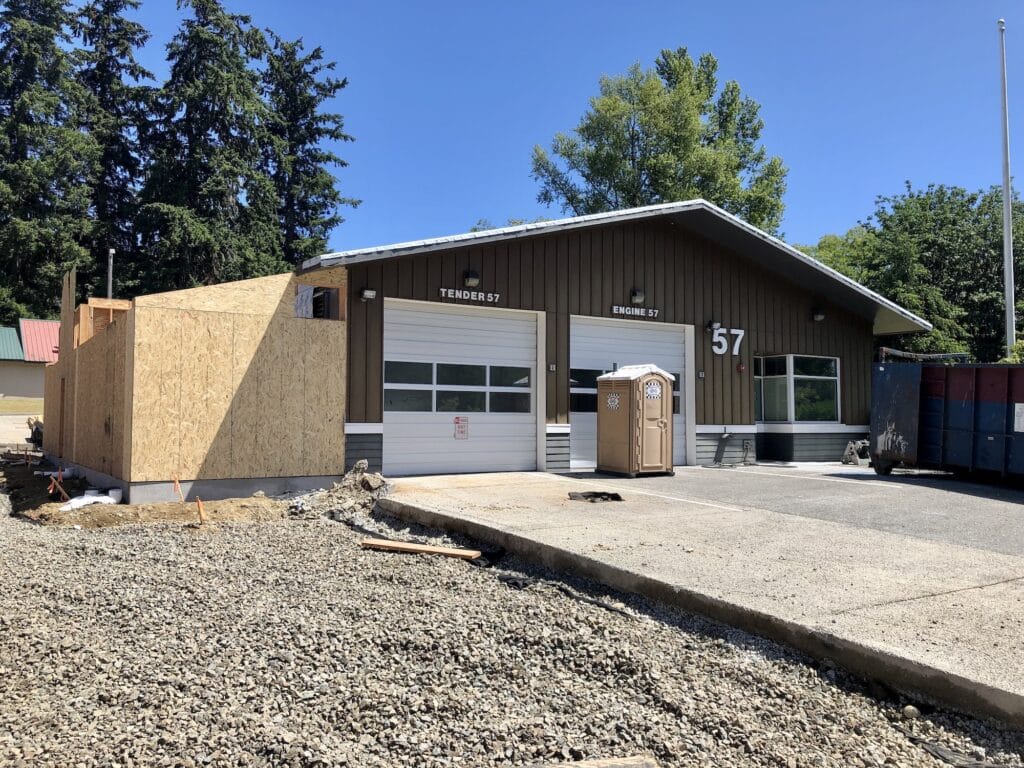
Crescent Valley Station 57 is undergoing the same modifications as the Fox Island station. Photo by Ed Friedrich
“It’s not logistically feasible to have our district rerated every six months to a year over and over,” he said. “It would just bounce around the district. I don’t know if it’s logistically possible or whether WSRB would do it, so there are a lot of questions.”
The chief emphasized to residents (watch video here) that the higher home insurance rates resulted from an anomaly in the rating system, said Tom Taylor, who has lived on southeast Fox Island for 60 years.
The change from Protection Class 5 to 9 will vary depending on the insurance company and amount of coverage on the property. But generally rates went up 20% to 40%, said Taylor, who works in the industry. His rose about 35%.
Fox Islanders want a staffed station
As important to residents as rising insurance rates is emergency responder coverage. After all the construction is completed and crews are no longer available to plug in from other stations, Fox Island needs its own full-time staff, as the department hopes to deliver.
“But the fact remains, when we don’t have a manned fire station. Fox Island residents on that end of the island are not being adequately served,” Taylor said.
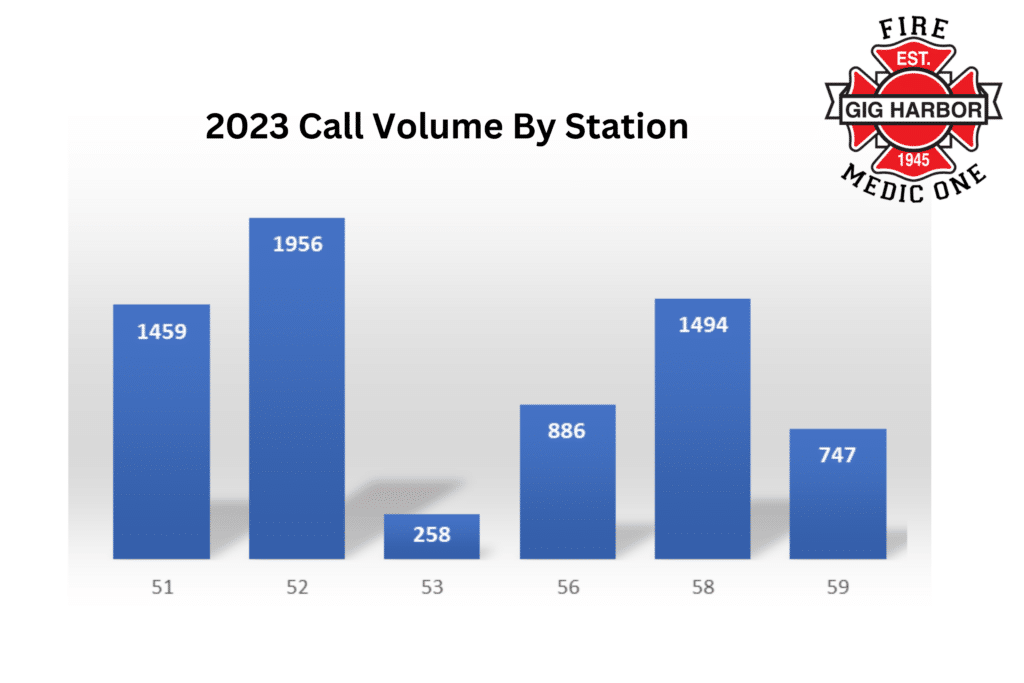
Station 51 is Kimball Drive, 52 Point Fosdick, 53 Fox Island, 56 Purdy, 58 Swede Hill and 59 Artondale.
Taylor pointed to a neighbor’s house that was destroyed the day after Christmas 2021 that he believes could have been contained to the garage. The home was a half mile from the station, 3-4 minutes away, but responders came from Artondale. The first engine, plying icy roads, arrived in 21 minutes.
“I think it’s just a matter of budgeting,” Taylor said. “They’ve got their priorities wrong. First and foremost, you have to take care of fire staffing. Not having fire and medical response on the island means when there is an accident on the bridge blocking traffic, as we had for three hours a few weeks ago, we do not have fire and medical response available in life-and-death situations. We need a 24-hour manned station in order to have the same services the rest of the fire district has in place.”
Rising premiums a problem everywhere
Though south Fox Island residents might have gotten an extra bump, it’s not just them who are seeing their homeowner’s insurance premiums jump. It’s a national trend.
In Washington, the cost of insurance for single-family homes spiked an average of more than 16% in 2023 and nearly 12% this year, said Aaron VanTuyl, spokesman for the state Office of the Insurance Commissioner, which approves rate increases.
Inflation is a main factor. It is more expensive to replace or repair homes today because of higher prices for materials and labor.
Companies are paying out more in damages caused by Washington extreme-weather events like storms and wildfires. For example, last summer’s fires near Spokane burned more than 350 homes, VanTuyl said.
Another big driver is insurance companies catching up after years of rate increases that didn’t keep up with claims. Nationally in 2023, companies paid out $1.11 in claims for every $1 collected in premiums, according to the American Property Casualty Association.
Washington home claims nearly doubled from $941 million in 2018 to $1.8 billion in 2021 and are expected to exceed $2 billion when 2023 numbers are finalized, VanTuyl said.


